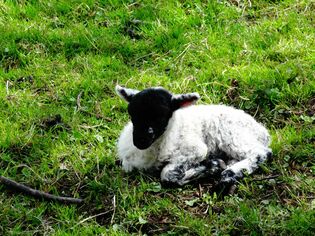
You're most likely to see lambs in Dales' fields from February to April. Most lambs are born outside without any help. Some farmers will bring ewes into barns or fields closer to the farm to help them lamb, particularly if the weather is bad or they are first time mothers.
Some sheep breeds, such as Swaledales are better mothers than others, even in adverse weather conditions.
Lambs are bred in early Spring when the weather is less harsh. In Spring time the grass is starting to grow again so there’s plenty to eat.
When we see cute lambs gambolling about the hillsides we often don’t acknowledge that for farmers lambing means huge responsibility and exhaustion. They have endless early mornings and late nights (if they get to bed at all), watching and helping ewes to lamb, making sure they bond, and the lambs are fed. If the weather is bad, the job is even harder.
The first few hours are vital, so farmers need to check on them so frequently. The initial colostrum milk carries essential antibodies and nutrition. Some lambs may need to be brought inside for feeding. In cold weather it’s important to keep up their energy levels with sufficient nutrition, and some ewes may be less good at suckling their lambs.
A strong elastic band is fixed around the base of the tail, which withers and falls off. This keeps their bottoms clean and free from disease. New born lambs are particularly susceptible to wet weather and may need extra protection: this is why you sometimes see them in plastic coats!
Please keep your dogs on a lead
After all this hard work, we really need to ask you to make sure you have your dogs on leads. Many say their dogs would never worry sheep. That may be true - my spaniels wouldn't chase sheep but they do chase rabbits and if they happened to be a field full of sheep while chasing rabbits, they'd freak the sheep. A pregnant ewe can abort due to shock, or get separated from her lambs in a panic. A farmer seeing that sight might well believe their sheep were in danger and they'd have every right to shoot my dogs.
By law if a dog causes damage by injuring or killing livestock, the keeper of the dog is liable for the damage. The law provides statutory defence to farmers who injure a dog in order to protect their livestock, if the dog is not under control.
Follow the story of a traditional Dales sheep farm
If you'd like to follow the story of a traditional Yorkshire Dales upland sheep farm breeding Swaledales, take a look at Glenda Calvert's blog.

 RSS Feed
RSS Feed
